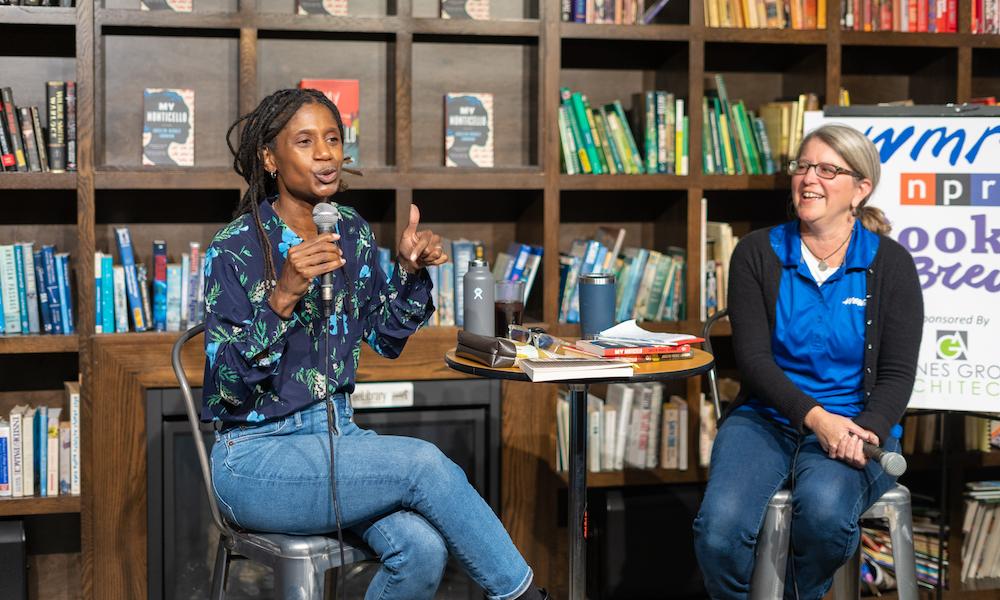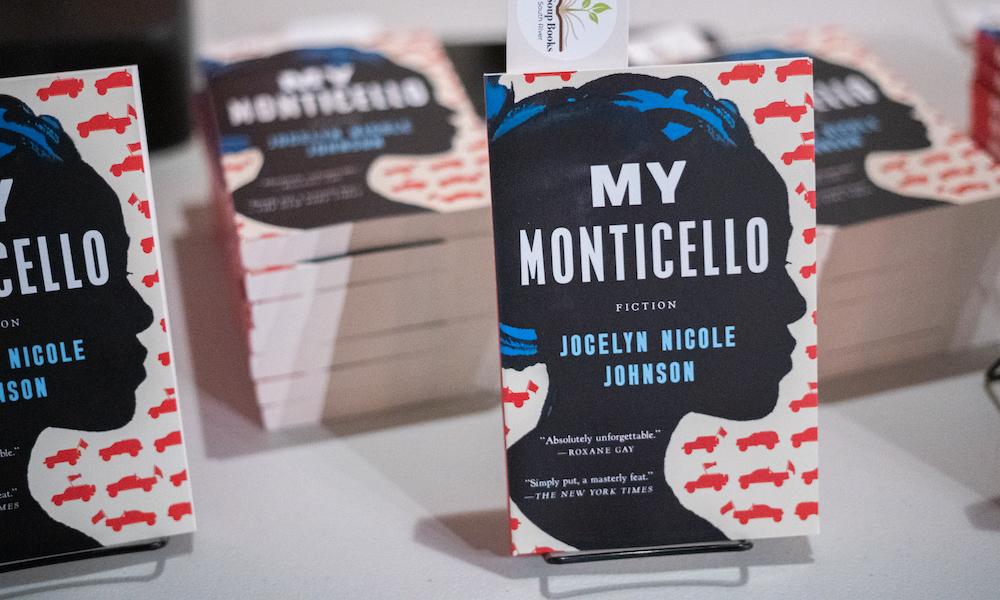A conversation with My Monticello author Jocelyn Nicole Johnson (’93)
Featured Stories
SUMMARY: In this one-on-one interview, Johnson reflects on her JMU days, why it’s important that we as a nation reckon with our past, and her vision for the future of America.
On Oct. 11, Jocelyn Nicole Johnson (’93) returned to Harrisonburg to discuss her highly acclaimed literary debut, My Monticello, as part of WMRA’s “Books & Brews” series at Pale Fire Brewing Co.
Set in the near future, My Monticello is a collection of short stories involving a diverse group of Charlottesville, Virginia, neighbors who wrestle with their sense of belonging while fleeing violent white supremacists. The book, published in October 2021, has received rave reviews and numerous accolades, including the Lillian Smith Book Award, the Library of Virginia Fiction Award, the Weatherford Fiction Award and the Balcones Fiction Prize. Time magazine, The New York Times, The Washington Post and NPR called it one of the best books of the year.
In this one-on-one interview, Johnson reflects on her JMU days, why it’s important that we as a nation reckon with our past, and her vision for the future of America.
Sadie Aram: Why did you choose JMU? Tell me about your Madison Experience.
Jocelyn Nicole Johnson: I chose JMU because it’s beautiful here. I liked that there was a campus, a sense of place. I grew up in Northern Virginia. My parents forced me to do a series of charts on whiteboards looking at the pros and cons of different colleges and JMU won. I ended up hanging out with a bunch of artsy, bohemian people and living in a lot of houses that had names like the Graffiti House. Learning what co-ops and composting were, and going to the Little Grill [Collective]. I went to Florence, Italy for a semester. That was a highlight. I think it was Fall 1992. And as an Art major, that was very cool to see.
Aram: You were a public school art teacher for 20 years. How has that chapter of your life affected your new chapter as an author?
Johnson: They’re very overlapped. This whole book was written while I was teaching full-time. I got quite a bit of inspiration from being around lots of students. Students in a public school give you a window into a lot of different lives and the ways people are.
Aram: Have you always been interested in writing?
Johnson: I was interested in all artistic expressions as a child. I kept up with the drawing, the visual arts and the writing pretty consistently. I went to a young writers workshop as a teenager, and I just kind of kept on writing.
Aram: How would you summarize My Monticello and its significance?
Johnson: It’s a collection of short stories that I think of as like pins in the map of Virginia. Once I decided to write a collection of stories, it occurred to me that one of the central themes is this idea of home. For me, Virginia is very much my home. But also, there are these ways in which it doesn’t feel entirely like home. Particularly after the “Unite the Right” rally in Charlottesville, where lots of people came under the banner of white supremacy and said, “This town is ours. And you shouldn’t feel but so at home here as a brown person or a black person.”
 |
Aram: Why did you decide to include those issues in a fictional narrative?
Johnson: Fiction is about the world. Even if you set a story on a far-off planet, it’s about the world that we live in too. For me, the kind of fiction that I enjoy is closely aligned with the real world. The source for my stories are the things that I’m seeing and hearing and thinking about and feeling. I would have no material but for the world that I live in.
Aram: Many JMU readers will recognize the settings of My Monticello and the short stories that precede it — cities like Charlottesville and Alexandria.
Johnson: You write what you’re familiar with and what you know. Or at least you start with that. I was thinking about all the places I’ve known and lived in Virginia in relation to the idea of home and belonging.
Aram: Did you draw inspiration from your time at JMU?
Johnson: There is a little window in one of the stories to my time here. I used the landscape of Harrisonburg. My character goes to an unnamed James Madison University. And I just drew from my experience. [As a student], I worked at a country club as a dishwasher briefly, and I have my character do that. And I also just drew from living here — going out in geology class and looking for quartz and seeing the land. I tried to evoke that in the stories.
Aram: Community is a big theme here at JMU, and community in the face of adversity is a key motif in your title story. How does this motif relate to institutions like JMU?
Johnson: The one thing I really like about the novella, which is kind of apocalyptic, is that there’s a little hidden utopia in the apocalypse. This band of characters take refuge at Monticello. And they make a diverse community where there’s a young female leader. They make a community where they’re growing things, and they’re thinking about taking care of the space and the environment. And so, I think any institution, any space where we’re building community, we have an opportunity to create a little utopia, right? We can think about how we’re going to create and nurture relationships between people in a healthy way. I think that is kind of essential.
Aram: Like Monticello, James Madison’s Montpelier capitalized off enslaved labor, and it wasn’t until a few years ago that a new exhibit opened highlighting the contributions of slaves to his estate. How do you feel about this trend in history toward more complete narratives and how it impacts present-day conversations about race and identity?
Johnson: I think it’s really, really important for us to acknowledge, learn about, discuss, think about and reckon with as full a history as we can. The good, the bad, the ugly. Particularly when the legacies of those histories still affect us and when people who have been affected by those histories are asking to be included in the conversation about now. It really relates. The past informs now. And now informs the future.
Aram: How do your stories reflect your own visions for the future of America?
Johnson: I’m writing about my racial and environmental anxieties. I’m writing about what is important to me, what I hope we do for one another, what I think a different response could be to some of the challenges we face. To me, it’s about relationships, flexibility, reckoning with the past, sharing power. And honoring the “outsider” characters — I say outsiders because I think that people who are on the outside of something, whether it be a racial justice issue or a gender issue, whatever it might be, have this secret power of being able to see things that someone who’s inside of it cannot. And often those outsider characters can provide us with insights and solutions that we might not see.
Aram: What do you hope readers will take away from My Monticello?
Johnson: I hope that readers will enjoy the language and feel for the characters and be engaged by the questions of the stories, which are: What kind of community do we want to build? Who is allowed to feel at home and where? How do we want to take care of our home planet? What do we want the future to look like?
Aram: What advice do you have for aspiring authors?
Johnson: First, joy. Make it fun and interesting for yourself. There’s going to be frustration, but there should also be fun with it as well. And the way you can make it fun is to not worry so much about what will happen with what you make or even how someone will receive it. Figure out what you want to say and do first.
Then find a community. For writers, find a writing group or a workshop — a small, safe space where people will read your thing carefully and tell you what they see in it. You’re not gonna listen to every single thing they say about your piece. You’re not gonna change everything they prescribe, but you’re going to understand your piece better and you’re gonna recognize what you’re doing by seeing it through other people’s eyes.
Lastly, be persistent as you try to find an audience. I published my first book at 50 years old. I was on my third agent and my third submission that went out. And this was the first book that was published. Some people may have a much quicker time. But for many of the writers I know, it takes a while to find a bigger audience or to find publication. And even when you do, the satisfaction, I think, of that isn’t as big as the satisfaction of making something that you feel really good about. So, get that part together first.
